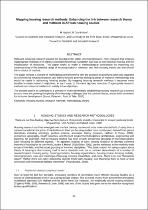 ResearchSpace
ResearchSpace
Mapping housing research methods: Enhancing the link between research theory and methods in African housing studies
JavaScript is disabled for your browser. Some features of this site may not work without it.
- ResearchSpace
- →
- Research Publications/Outputs
- →
- Conference Publications
- →
- View Item
| dc.contributor.author |
Napier, Mark

|
|
| dc.contributor.author |
Crankshaw, Beth P

|
|
| dc.date.accessioned | 2019-03-25T14:07:15Z | |
| dc.date.available | 2019-03-25T14:07:15Z | |
| dc.date.issued | 2018-10 | |
| dc.identifier.citation | Napier, M. and Crankshaw, B.P. 2018. Mapping housing research methods: Enhancing the link between research theory and methods in African housing studies. Out-Of-The Box 2018 Conference Proceedings, CSIR Knowledge Commons, CSIR, Pretoria, 24-25 October 2018, pp. 46-59 | en_US |
| dc.identifier.isbn | 978-0-7988-5639-3 | |
| dc.identifier.uri | http://www.sti4shs.co.za/sites/default/files/events/conferences/2018-12/Out-Of-The%20Box%202018%20Conference%20Proceedings.pdf | |
| dc.identifier.uri | http://www.sti4shs.co.za/events/conferences/ootb | |
| dc.identifier.uri | http://hdl.handle.net/10204/10847 | |
| dc.description | Paper presented at the Out-Of-The Box 2018 Conference, CSIR Knowledge Commons, CSIR, Pretoria, 24-25 October 2018 | en_US |
| dc.description.abstract | Relevant, empirical research creates the foundation for better informed decisions. Poor research that employs inappropriate methods or is without a broader theoretical foundation can lead to poor decision making and the misallocation of resources. This paper seeks to make a methodological contribution by improving our understanding of the potential range of housing research methods, and how housing theory can and should link to choice of method. The paper reviews a number of methodological frameworks with the purpose of identifying what was regarded as conventional housing research, and then to explore potential emerging areas of research methodology that would be useful in advancing housing studies. By mapping housing research methods it becomes more feasible to relate research objectives, in each case, to the more rigorous selection of appropriate research methods and mixes of methods to satisfy those objectives. The broader goal is to contribute to a process of more deliberately establishing housing research as a science so as to meet the growing complexity of the housing challenges that the continent faces, and to build innovation for inclusive development (Kruss, Petersen, Rust, & Tele, 2017). | en_US |
| dc.language.iso | en | en_US |
| dc.publisher | DST and CSIR | en_US |
| dc.relation.ispartofseries | Worklist;22168 | |
| dc.subject | Housing studies | en_US |
| dc.subject | Research methods | en_US |
| dc.subject | Methodology | en_US |
| dc.subject | Theory | en_US |
| dc.title | Mapping housing research methods: Enhancing the link between research theory and methods in African housing studies | en_US |
| dc.type | Conference Presentation | en_US |
| dc.identifier.apacitation | Napier, M., & Crankshaw, B. P. (2018). Mapping housing research methods: Enhancing the link between research theory and methods in African housing studies. DST and CSIR. http://hdl.handle.net/10204/10847 | en_ZA |
| dc.identifier.chicagocitation | Napier, Mark, and Beth P Crankshaw. "Mapping housing research methods: Enhancing the link between research theory and methods in African housing studies." (2018): http://hdl.handle.net/10204/10847 | en_ZA |
| dc.identifier.vancouvercitation | Napier M, Crankshaw BP, Mapping housing research methods: Enhancing the link between research theory and methods in African housing studies; DST and CSIR; 2018. http://hdl.handle.net/10204/10847 . | en_ZA |
| dc.identifier.ris | TY - Conference Presentation AU - Napier, Mark AU - Crankshaw, Beth P AB - Relevant, empirical research creates the foundation for better informed decisions. Poor research that employs inappropriate methods or is without a broader theoretical foundation can lead to poor decision making and the misallocation of resources. This paper seeks to make a methodological contribution by improving our understanding of the potential range of housing research methods, and how housing theory can and should link to choice of method. The paper reviews a number of methodological frameworks with the purpose of identifying what was regarded as conventional housing research, and then to explore potential emerging areas of research methodology that would be useful in advancing housing studies. By mapping housing research methods it becomes more feasible to relate research objectives, in each case, to the more rigorous selection of appropriate research methods and mixes of methods to satisfy those objectives. The broader goal is to contribute to a process of more deliberately establishing housing research as a science so as to meet the growing complexity of the housing challenges that the continent faces, and to build innovation for inclusive development (Kruss, Petersen, Rust, & Tele, 2017). DA - 2018-10 DB - ResearchSpace DP - CSIR KW - Housing studies KW - Research methods KW - Methodology KW - Theory LK - https://researchspace.csir.co.za PY - 2018 SM - 978-0-7988-5639-3 T1 - Mapping housing research methods: Enhancing the link between research theory and methods in African housing studies TI - Mapping housing research methods: Enhancing the link between research theory and methods in African housing studies UR - http://hdl.handle.net/10204/10847 ER - | en_ZA |





